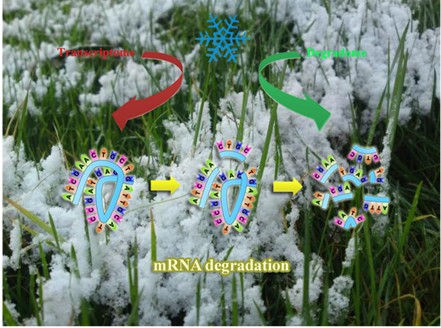The messenger RNA degradation is a critical factor in determining mRNA abundance and enables rapid adjustment of gene expression in response to environmental stress. However, little is known about the functional mechanism of mRNA degradation under stressful environmental conditions. In Prof. Kang Chong’s Lab, a global study of uncapped mRNAs via parallel analysis of RNA ends (PARE) as well as transcriptome analysis were performed in Brachypodium under cold stress condition. PARE and RNA-seq analyses identify four types of mRNA decay patterns. Type II genes, for which light-harvesting processes are over-represented in gene ontology analyses, show unchanged transcript abundance and altered uncapped transcript abundance. Uncapping-mediated transcript stability of light harvesting-related genes changes significantly in response to cold stress, which may allow rapid adjustments in photosynthetic activity in response to cold stress. Transcript abundance and uncapped transcript abundance for type III genes changes in opposite directions in response to cold stress, indicating that uncapping-mediated mRNA degradation plays a role in regulating gene expression. Endonucleolytic cleavages are detected and further analyzed with quantitative splinted-ligation reverse transcriptase polymerase chain reaction assay (qSL-RT-PCR) and ligation-mediated poly(A) test (LM-PAT) assay, uncovering another way of modulating gene expression. To our knowledge, this is the first global analysis of mRNA degradation under environmental stress conditions in Brachypodium, which will deepen our understanding of mRNA degradation under stressful environmental conditions, as well as the cold stress response mechanism in monocots.
This study was published on Genome Biology(doi:10.1186/gb-2013-14-8-r92) in August, and was supported by the National Natural Science Foundation of China and the Main Direction Program of Knowledge Innovation of Chinese Academy of Sciences.

Figure 1. a global study of mRNA degradation under cold stress through high-throughput sequencing
The messenger RNA degradation is a critical factor in determining mRNA abundance and enables rapid adjustment of gene expression in response to environmental stress. However, little is known about the functional mechanism of mRNA degradation under stressful environmental conditions. In Prof. Kang Chong’s Lab, a global study of uncapped mRNAs via parallel analysis of RNA ends (PARE) as well as transcriptome analysis were performed in Brachypodium under cold stress condition. PARE and RNA-seq analyses identify four types of mRNA decay patterns. Type II genes, for which light-harvesting processes are over-represented in gene ontology analyses, show unchanged transcript abundance and altered uncapped transcript abundance. Uncapping-mediated transcript stability of light harvesting-related genes changes significantly in response to cold stress, which may allow rapid adjustments in photosynthetic activity in response to cold stress. Transcript abundance and uncapped transcript abundance for type III genes changes in opposite directions in response to cold stress, indicating that uncapping-mediated mRNA degradation plays a role in regulating gene expression. Endonucleolytic cleavages are detected and further analyzed with quantitative splinted-ligation reverse transcriptase polymerase chain reaction assay (qSL-RT-PCR) and ligation-mediated poly(A) test (LM-PAT) assay, uncovering another way of modulating gene expression. To our knowledge, this is the first global analysis of mRNA degradation under environmental stress conditions in Brachypodium, which will deepen our understanding of mRNA degradation under stressful environmental conditions, as well as the cold stress response mechanism in monocots.
This study was published on Genome Biology(doi:10.1186/gb-2013-14-8-r92) in August, and was supported by the National Natural Science Foundation of China and the Main Direction Program of Knowledge Innovation of Chinese Academy of Sciences.

Figure 1. a global study of mRNA degradation under cold stress through high-throughput sequencing
